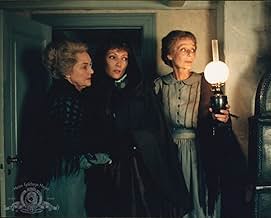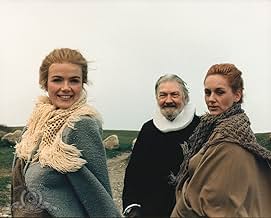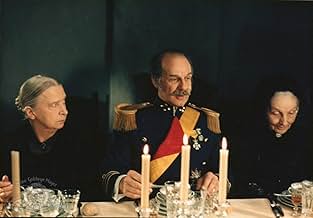PUNTUACIÓN EN IMDb
7,8/10
23 mil
TU PUNTUACIÓN
A finales del siglo XIX, una comunidad estríctamente religiosa en un pueblo danés acoge a un refugiado de la guerra franco-prusiana.A finales del siglo XIX, una comunidad estríctamente religiosa en un pueblo danés acoge a un refugiado de la guerra franco-prusiana.A finales del siglo XIX, una comunidad estríctamente religiosa en un pueblo danés acoge a un refugiado de la guerra franco-prusiana.
- Dirección
- Guión
- Reparto principal
- Ganó 1 premio Óscar
- 11 premios y 8 nominaciones en total
Stéphane Audran
- Babette Hersant
- (as Stephane Audran)
Jean-Philippe Lafont
- Achille Papin
- (as Jean Philippe Lafont)
Ghita Nørby
- Narrator
- (voz)
Asta Esper Hagen Andersen
- Anna
- (as Asta Esper Andersen)
Reseñas destacadas
This movie is almost unknown, but it is very good. In a lonely Danish town, two old sisters live remembering a far youths, when, due to a strict puritan education, they had to reject happiness. Lonely, then, the live in a dignified austerity, until Babette, who flies from Paris, frightened by the horror of the war, arrives. In few time, she will be able to turn the goodness and love she received when she arrived. A good lottery prize lets her organize a great banquet, following the best rules of French gastronomy. All neighbourhoods are invited (all fanatically puritans). They accept, but they pact to not show any trace of pleasure or enjoyment, as it would be a sin. However, the seductive force of the delicious meal they eat, that they become seduced by the sensuality of French gastronomy. The banquet end in a very felt, though quietly, happiness. The love between humans has awaken. The miracle of rise the human kindness due to the pleasure of the sense has begun. The movie is surprisingly good, but it is not for all tastes. During most of the movie, nothing happens, all is so quiet and so peaceful, that during many minutes, you can only see the life of the inhabitants of the town. But, as the movie develops, it becomes more precious, when Babette wins the lottery prize (after 30min movie), the show begins. The author is able, with a perfect directing, to show us how Babette prepares the banquet, how she mixes all the ingredients with the most wonderful one (Love), all told in a quiet delicious way, with a perfect knowledge of photography and acting. Then, as the banquet goes by, the quality in showing us how the mood of all eaters changes due to the meal, only with first shots, with impressively filmed scenes one after another is simply astonishing. In addition, the tact with the colours and the photography is also superb, almost every scene of the movie is like a picture, so work is involved there. If you are able to admire good cinema and are able to realize that sometimes the way on telling you something rather than what is told is more important, this is your movie. If you happen to like good meals and just love the good gastronomy, probably, you'll feel amused, as most feelings of the movie will be familiar to you. An Oscar totally deserved. The only problem is its slowness at setting up the story, but, I can forgive it (I hope everyone too)
"Babette's Feast" proves that not all film theories and formulas are true 100% of the time. Here's a story where there is no life-or-death conflict, no raging anger, no violent outbursts. Nothing blowed up real good, and there is nothing resembling a chase scene. The conflict is about the ways in which people can be nice to each other. Their personal differences of passion or conviction are not as important as the ways in which they can connect with each other.
How shockingly refreshing.
There is an undercurrent to this film that gives it the feel of a Garrison Keillor monologue, in that it is built around people's personal foibles and quirks.
Even more refreshing is how "Babette's Feast" manages to be nice without becoming cloying, saccharine, facile, superficial or insincere. People's personal passions are portrayed not only from their own perspective, but from the perspective of the people they affect, with more realism than you usually get in film, yet also with sincere and infectious optimism.
If you don't come away from "Babette's Feast" smiling and feeling better, then you must have been distracted from giving it your full attention. This is one of those very rare films that you can recommend to everyone you know. It is truly in a class by itself. Like Mary Poppins, "Practically perfect in every way."
Utterly charming and subtly stunning.
How shockingly refreshing.
There is an undercurrent to this film that gives it the feel of a Garrison Keillor monologue, in that it is built around people's personal foibles and quirks.
Even more refreshing is how "Babette's Feast" manages to be nice without becoming cloying, saccharine, facile, superficial or insincere. People's personal passions are portrayed not only from their own perspective, but from the perspective of the people they affect, with more realism than you usually get in film, yet also with sincere and infectious optimism.
If you don't come away from "Babette's Feast" smiling and feeling better, then you must have been distracted from giving it your full attention. This is one of those very rare films that you can recommend to everyone you know. It is truly in a class by itself. Like Mary Poppins, "Practically perfect in every way."
Utterly charming and subtly stunning.
If you find the first 30 minutes of this film to be so slow that you wonder why you're watching it, don't give up. Also, hearing the Danish language is a bit new to most North Americans, who don't see and hear a lot of Danish films. Anyway, as the film progressed it got better and better and the viewer is rewarded for his/her patience.
Being a fan of the movie, "Out Of Africa," this film piqued my interest because it's based on a short novel by Isak Dinesen (Karen Blixen), the major character in that film.
The meal - Babette's feast - was amazing. I'm no chef, but I was impressed! How one interprets the story, too, varies, I suppose depending on how much you read into this, and where you stand religion-wise. If the latter, how you look at the definition of "legalism" can affect how you interpret this story.
In any case, it's a fine film, but don't watch this if you're dieting.
Being a fan of the movie, "Out Of Africa," this film piqued my interest because it's based on a short novel by Isak Dinesen (Karen Blixen), the major character in that film.
The meal - Babette's feast - was amazing. I'm no chef, but I was impressed! How one interprets the story, too, varies, I suppose depending on how much you read into this, and where you stand religion-wise. If the latter, how you look at the definition of "legalism" can affect how you interpret this story.
In any case, it's a fine film, but don't watch this if you're dieting.
This delicately told and moving story about the two devout daughters of a Danish Lutheran minister and their French servant is one of the finest European films of the 1980s. Set in a small, remote, austere Danish seaside town in the mid-19th century, the daughters devote their lives to continuing the work of their father in service of God, and in care for their needy townspeople. One of the daughters had turned down a promising opera career -- and the love of her French voice coach (a famous opera singer himself) -- to remain with her father and the town. Many years later the French singer sends a woman (Babette) -- who had lost her family in an outbreak of civil war -- to live with the sisters. She turns out to be an excellent cook, housekeeper and a shrewd shopper. The story culminates in a sumptuous feast prepared by Babette coinciding with a memorial to the reverend minister's 100th birthday. This delicious screenplay was adapted from the Isak Denisson (pen name for Karen Blixen) short story originally published in the Ladies Home Journal.
This movie came aside as a shock in the eighties.Far from trends,that is to say in the heart of sincere creativity,Babettes gaestebud stands as one of the finest movies of its time.Stephane Audran,the wonderful actress of her ex-husband Claude Chabrol's greatest achievements (le boucher,la rupture,les noces rouges,all unqualified musts for movie buffs)gave a lifetime performance.To see her prepare with love and affection her meal is a feast for the eyes.All the people who saw this masterpiece actually tasted,ate Babette's culinary triumph. But the most moving part of the story is its conclusion:Babette was a great French chef,she was famous,now she found a new homeland but her heyday is behind her and she won't never be allowed to come back to her dear France.So the two old sisters do comfort her:In heaven,there will be huge kitchens where she'll cook for eternity.While sharing her fortune with her new friends,Babette changed their life,she gave them pleasure and a magic evening they would remember forever.In this simple but extraordinary screenplay,human warmth is everywhere,and I wish everybody a Babette's feast,would it be only for one starry night...
¿Sabías que...?
- CuriosidadesFirst Danish movie to win an Academy Award for best foreign language film.
- PifiasIn 1871 Babette pays with skilling, which was the currency used at that time; 14 years later, Babette still uses skilling, but Denmark changed the currency in 1875 from skilling to kroner and orer.
- ConexionesEdited into Eventyret om dansk film 18: Nye perspektiver - 1970-1987 (1996)
- Banda sonoraWaltz No. 15 in A-flat major Op. 39
(arranged for orchestra) (uncredited)
Written by Johannes Brahms
Played during the dance hosted by the Royal family
Selecciones populares
Inicia sesión para calificar y añadir a tu lista para recibir recomendaciones personalizadas
Detalles
- Fecha de lanzamiento
- País de origen
- Idiomas
- Títulos en diferentes países
- Babette's Feast
- Localizaciones del rodaje
- Empresas productoras
- Ver más compañías en los créditos en IMDbPro
Taquilla
- Recaudación en Estados Unidos y Canadá
- 4.398.938 US$
- Recaudación en todo el mundo
- 4.637.920 US$
- Duración1 hora 43 minutos
- Mezcla de sonido
- Relación de aspecto
- 1.66 : 1
Contribuir a esta página
Sugerir un cambio o añadir el contenido que falta

Principal laguna de datos
By what name was El festín de Babette (1987) officially released in India in English?
Responde






























